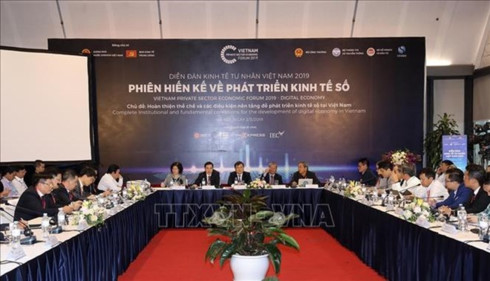
Delegates discuss ways of further developing the digital economy at the conference. (Photo: VNA)
Vietnam Economic Times reported that during a conference held as part of the Vietnam Private Sector Economic Forum 2019 in Hanoi on May 2, Vu Dai Thang, Vice Minister of Planning and Investment, cited a joint study by Google and Singapore-based investment Temasek Holdings as showing that the country’s digital economy posted US$3 billion in revenues in 2015 and US$9 billion in 2018.
This figure is expected to reach US$30 billion by 2025, Thang added.
Underpinning huge potential for the digital economy, the vice minister also quoted a forecast by Australia’s data innovation group Data 61 that the nation’s GDP value could reap an additional US$162 billion within 20 years if digital transformation is carried out successfully.
He underscored the need to shape a basic perception of the digital economy which covers all economic activities based on digital platforms. Given this, the Ministry of Planning and Investment is scheduled to map out strategies aimed at boosting the development of the digital economy and Industry 4.0.
Nguyen Thanh Hung, Vice Minister of Information and Communications, said the digital economy would force local firms to renew their production process and business towards joining an ecosystem that comprises of three key elements; production, trading, and distribution.
Meanwhile, Brian Hull, country managing director of ABB in Vietnam, suggested the country needs to accelerate the process of digital development in all realms as technologies have greatly affected all aspects of the Vietnamese economy.
Digital development powered by cutting-edge technologies could pose serious challenges for local firms, particularly small-sized ones that might struggle to keep pace with rapidly changing digital trends.
The Government and big corporations should therefore guide and support smaller firms to gain access to new production technologies and assist in putting them into practice.
Vice Minister Hung said the ministry is currently developing a national project relating to digital transformation that features both specific tasks and solutions.
A draft of the project indicates that the country looks to have at least half of local firms run their business on digital platforms in the hope that digital industries will contribute 20 per cent to the country’s annual GDP value.
Hung raised his concerns that a major deadlock for digital transformation and data connections remains over policies not technical issues. The project is expected to ease this barrier, he added.
Regarding digital transformation within the local financial sector, Dao Minh Tuan, deputy general director of Vietcombank claimed that although the Government has planned to pursue a cashless economy, there are currently no many preferential policies in place to encourage firms to get involved in the scheme.
Therefore, a large number of local businesses have been hesitant to use new payment methods, Tuan said.
Pham Tien Dung, head of the Payment Department under the State Bank of Vietnam, said the legal framework is lagging three to five years behind technological trends. He called for piloting state management mechanisms for some digital aspects.
During the conference, participants noted that Vietnam’s digital economy has made progress in both infrastructure and business market over the past decade.
The digital economy now features new technologies such as blockchain, social media, e-business, e-commerce, and precision agriculture.
However, aside from an incomplete legal framework, Vietnam is faced with other emerging problems such as a shortage of high quality ICT personnel and IT applications in building e-government./.
VOV
 Collective economy—a sustainable direction to escape poverty
Collective economy—a sustainable direction to escape poverty



